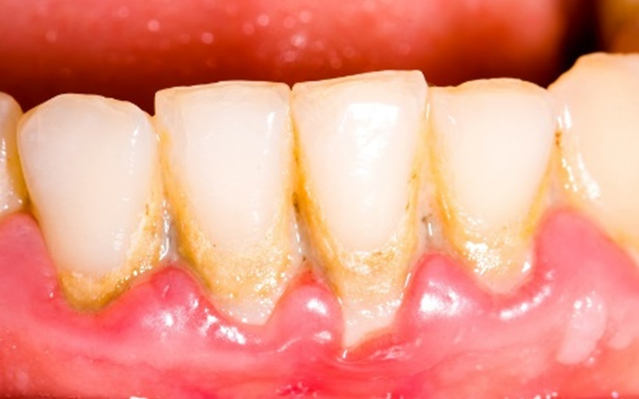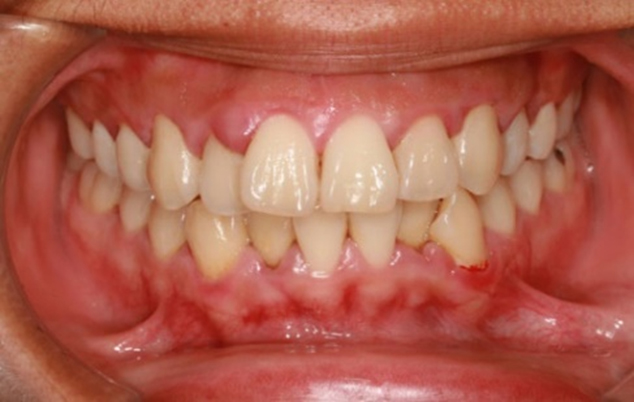Aside from healthy teeth and an attractive smile, preventative dentistry can greatly reduce the risk of cavities, gingivitis, enamel loss, periodontitis, and other common dental problems.
Oral health is also connected to your overall health. Since the mouth is a bacterial breeding ground, maintaining good oral health can benefit your overall health as well.
Some dental problems can be linked to other health issues such as:
- Cardiovascular disease
- Diabetes
- Strokes
In addition to reducing the risk of these health issues, preventative dentistry can save you money as well. Even with good dental insurance, or Government assistance the costs of treating dental issues and conditions can add up quickly.
What is plaque and Gingivitis?

Plaque

Gingivitis
Plaque is a sticky, soft film containing millions of bacteria. If not regularly removed through brushing, flossing, and hygiene treatments, the bacteria in plaque can cause gum disease and tooth decay. When you eat, plaque bacteria use the sugars contained in many foods to produce acids. These acids eat away at the protective enamel coating your teeth. Repeated exposure to these acids can cause the enamel to breakdown and eventually cause a hole in the tooth.
As plaque, tartar, and bacteria continue to build up, they can affect your gum tissue, leading to swollen, red, and inflamed gums that bleed easily. This is called gingivitis, which is an early stage of periodontitis or gum disease.
Periodontitis is a serious form of gum disease that occurs as a result of a bacterial infection. It causes your gums to dissolve or recede and the bone supporting your teeth to break down and result in loosing teeth.
Can preventative dentistry help minimise plaque buildup?
Yes, regular brushing, flossing, and cleanings can certainly help. However, adjusting your diet can also help.
Since plaque requires sugars and carbohydrates to form, the more sugar and carbs you eat, the more plaque formation you will have. In order to prevent plaque buildup, it’s best to avoid or limit your intake of candy, soda, and other sweets as much as possible.
That being said, many healthy, non-sweet foods, such as bread, potatoes, corn, and cereal, also contain carbohydrates. So, some plaque will form whenever you eat, even if you completely eliminate sweets from your diet.
The best way to resolve this is to brush and floss on a regular basis. Not only does brushing remove plaque, but it removes food particles that develop into plaque as well.
Meanwhile, flossing helps remove plaque and food particle from in between your teeth where toothbrush bristles can’t reach.
Smoking and drinking high acid drinks can negatively affect the health of your teeth and gums.
Smoking can stain your teeth, worsen gum disease, and lead to tooth loss or even cancer.
High acid and alcohol drinks can also cause mouth cancer, and since some mixed drinks can contain a lot of sugar and acids, drinking them in large amounts can cause enamel erosion and tooth decay.
If you drink and smoke, you’re at an even a greater risk of experiencing poor dental and oral health.
- Brush your teeth with a fluoride toothpaste once in the morning and once before bed.
- Brush according to the instructions of your dentist or dental hygienist.
- Do not rinse your mouth after brushing. This will allow the fluoride to remain on your teeth for longer.
- Use floss or interdental brushes to clean in between your teeth after and in between brushes.
- Use mouthwash. Fluoride and antibacterial ingredients can be found in many mouthwashes to help prevent gum disease and decay. Rather than using mouthwash after brushing, use it in between brushes for added protection all day long.
In addition to brushing, flossing, and using mouthwash, there are other steps you can take to prevent tooth decay, gum disease, and the need for costly treatment, including:
- Minimise your consumption of sugary foods and drinks.
- Use a straw when drinking acidic or carbonated drinks to reduce their effect on your teeth.
- Regularly chew sugar-free gum to boost saliva production, prevent dry mouth, reduce plaque, and fight against dental decay.
- Regularly visit your dental team as often as recommended.
Brush your teeth twice daily. The most important aspect of preventative dentistry is to brush your teeth twice each day with a toothbrush and fluoride toothpaste approved by your dentist or dental hygienist. The way you brush is also important. Make sure to take your time and gently move the brush in small circular motions in order to remove as much plaque as possible. Also, don’t forget to brush your tongue. Doing so will help remove additional bacteria from your mouth and freshen your breath as well.
Floss Daily. Flossing each day after you brush and in between meals will help clean food particles and bacteria from in between your teeth. However, as is the case with brushing, it’s important to floss correctly in order to gain the most benefit. Just ask your dentist to demonstrate proper flossing techniques during your next preventative dentistry appointment.
Eat a well-balanced diet. Eating a well-balanced diet will provide your teeth with the vitamins and nutrients they need to remain healthy and strong. Meanwhile, limiting your sugar intake will reduce plaque buildup and help prevent the need for costly dental treatments down the road.
Visit your dentist. Brushing and flossing is great, but taking proper care of your teeth also means visiting a dentist every six months for routine cleanings, checkups, and preventative care. That being said, the higher your risk for dental problems, the greater you’ll benefit from more frequent visits.

